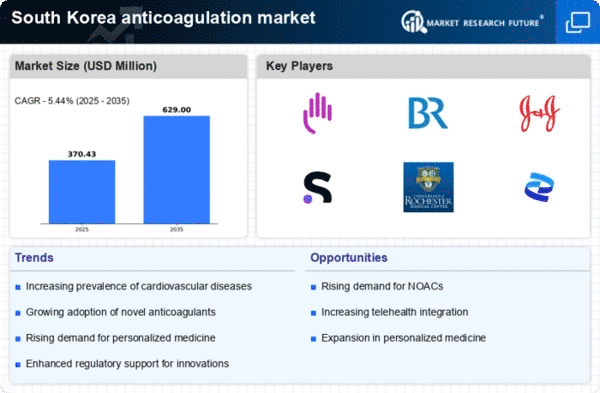Rising Geriatric Population
The demographic shift towards an aging population in South Korea is a significant driver for the anticoagulation market. As the geriatric population expands, the prevalence of age-related health issues, including thromboembolic disorders, is expected to rise. Older adults are more susceptible to conditions that necessitate anticoagulation therapy, such as atrial fibrillation and deep vein thrombosis. This demographic trend is likely to create a sustained demand for anticoagulants, as healthcare systems adapt to the needs of an aging society. Consequently, the anticoagulation market is poised for growth, with pharmaceutical companies focusing on developing age-appropriate formulations and treatment regimens.
Growing Awareness of Preventive Healthcare
There is a notable increase in awareness regarding preventive healthcare measures among the South Korean population, which is positively impacting the anticoagulation market. Educational campaigns and initiatives by healthcare organizations are emphasizing the importance of early detection and management of thromboembolic disorders. This heightened awareness is leading to more individuals seeking medical advice and treatment options, thereby driving the demand for anticoagulants. Furthermore, the government’s focus on enhancing healthcare accessibility and affordability is likely to facilitate greater patient engagement in preventive care. Consequently, the anticoagulation market is expected to expand as more patients are diagnosed and treated for conditions requiring anticoagulation therapy.
Technological Advancements in Drug Development
Technological innovations in drug development are significantly influencing the anticoagulation market. The advent of advanced research methodologies and biotechnological processes has led to the creation of novel anticoagulants with improved efficacy and safety profiles. In South Korea, the integration of artificial intelligence and machine learning in drug discovery is streamlining the development process, potentially reducing time-to-market for new therapies. This technological evolution not only enhances the competitive landscape but also addresses the unmet medical needs of patients. As a result, the anticoagulation market is likely to witness an influx of innovative products, catering to diverse patient populations and treatment scenarios.
Increasing Incidence of Cardiovascular Diseases
The rising prevalence of cardiovascular diseases in South Korea is a primary driver for the anticoagulation market. According to health statistics, cardiovascular diseases account for a significant portion of mortality rates, prompting a greater need for effective anticoagulation therapies. As the population ages, the incidence of conditions such as atrial fibrillation and venous thromboembolism is expected to rise, leading to an increased demand for anticoagulants. This trend is likely to propel the market forward, as healthcare providers seek to implement preventive measures and treatment options. The anticoagulation market is projected to grow as more patients require long-term anticoagulation therapy, thereby creating opportunities for pharmaceutical companies to innovate and expand their product offerings.
Regulatory Framework Supporting Anticoagulant Approvals
The regulatory environment in South Korea is becoming increasingly supportive of new anticoagulant approvals, which is a crucial driver for the anticoagulation market. The Ministry of Food and Drug Safety (MFDS) has streamlined the approval process for innovative therapies, allowing for faster access to new anticoagulants. This regulatory support encourages pharmaceutical companies to invest in research and development, fostering a competitive market landscape. As a result, the introduction of new products is anticipated to enhance treatment options available to healthcare providers and patients alike. The anticoagulation market is likely to benefit from this favorable regulatory climate, leading to increased market growth and diversification.
















